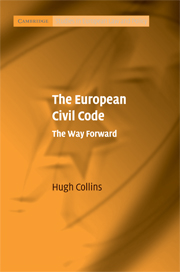Book contents
- Frontmatter
- Contents
- Preface
- Series editors' Preface
- Table of cases
- Table of treaties and legislation
- I Civil society and political union
- II The acquis communautaire in private law
- III The hidden code
- IV Private law and the Economic Constitution
- V Cultural diversity and European identity
- VI Respecting legal diversity
- VII Multi-level private law
- VIII Strengthening convergence
- IX Exploring the European Social Model
- Index
- CAMBRIDGE STUDIES IN EUROPEAN LAW AND POLICY
- References
I - Civil society and political union
Published online by Cambridge University Press: 26 February 2010
- Frontmatter
- Contents
- Preface
- Series editors' Preface
- Table of cases
- Table of treaties and legislation
- I Civil society and political union
- II The acquis communautaire in private law
- III The hidden code
- IV Private law and the Economic Constitution
- V Cultural diversity and European identity
- VI Respecting legal diversity
- VII Multi-level private law
- VIII Strengthening convergence
- IX Exploring the European Social Model
- Index
- CAMBRIDGE STUDIES IN EUROPEAN LAW AND POLICY
- References
Summary
Napoléon Bonaparte in defeat and exile dreamt of a future ‘association européen’ with ‘one code, one court, one currency’.
Was Napoléon's speculation about the composition of the future European Union one of his dangerous fantasies? Or was he correct to believe that an association between the peoples of Europe would have to be founded on and sustained by unified laws, a single system of justice and a common currency? Are these apparently technical and humdrum matters concerning the law and commerce the crucial cement for binding together the nations and regions of Europe? Surely these devices could not be as important to the future of the European Union as the controversial topics debated in the press about constitutions, institutional reform, a rapid response force, a common foreign policy, the ‘democratic deficit’ and allegations of inefficiency and corruption? Notwithstanding the lack of media interest in the ordinary law of commerce and private relations, my thesis supports Napoléon's speculation: unified law, especially the laws governing commonplace social and economic interactions between people, could make a vital contribution to the future of the European Union. The general framework of this argument can be expressed in a few general propositions.
(1) The European Union today is a political structure without a community. It is a system of government for a continent, but this territory is fragmented into many political and cultural communities. Although nation states have pooled some of their sovereign powers in the institutions of the European Union, at the level of everyday social interactions, national borders still present serious obstacles to the formation of a single community – a transnational civil society. Because the European Union does not rest on a deeply integrated civil society, its political union often proves fragile and dysfunctional, to the detriment of all.
[…]
- Type
- Chapter
- Information
- The European Civil CodeThe Way Forward, pp. 1 - 27Publisher: Cambridge University PressPrint publication year: 2008



